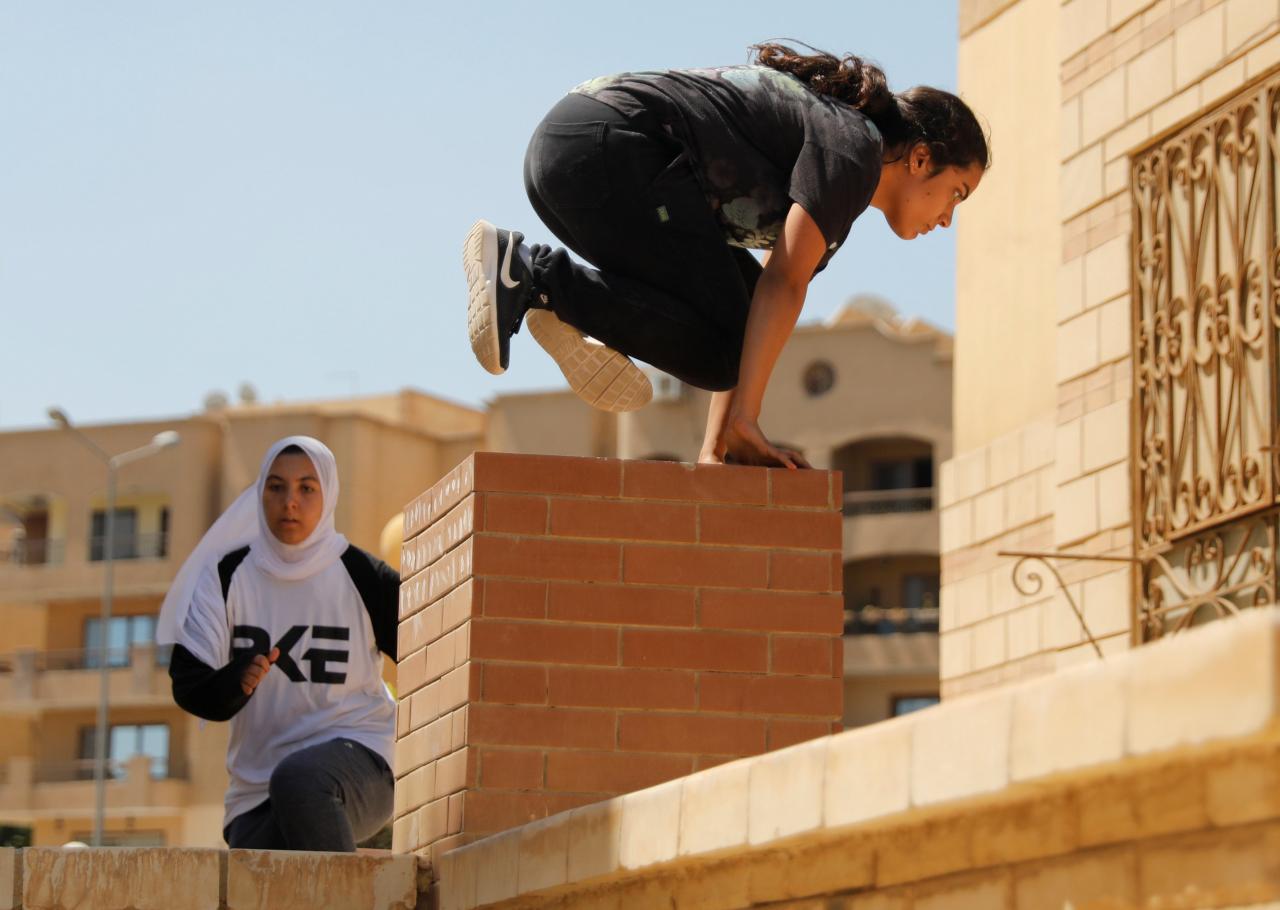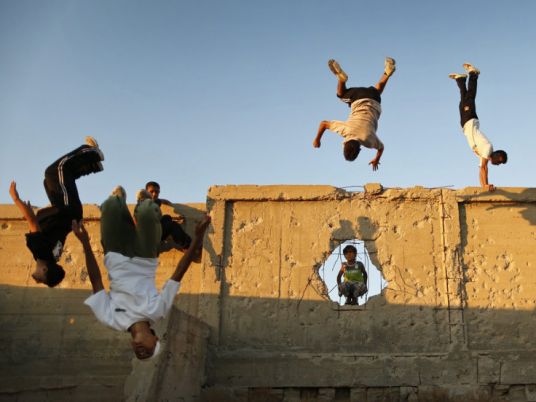Last week, a group of young Egyptians engaged in an unconventional mix of acrobatic gymnastics and break dancing, known as parkour, to raise environmental awareness. The Parkour Egypt team performed the show for spectators at the Wadi Degla Sporting Club in the Tagammu el-Awwal district of Cairo, during which they discussed the problems of climate change and global warming.
A day later, parkour teams Egy-Flow and Team Free Alex performed their show in al-Azhar Park, near downtown Cairo. In sporty reference to combating global warming, the participants wore t-shirts reading: Jump start the climate deal with a power sector carbon budget, Drop global power sector emissions by at least 10% by 2020, and Roll out clean, green electricity across the world.
“We are organizing these events here in Egypt in coordination with Parkour Generations and Sandbag,” Mohamed Sobhy, the organizer of the event and one of Egy-Flow’s team instructors, told Al-Masry Al-Youm English Edition. Parkour Generations is a London-based academy of experts from around the world, while Sandbag is a UK-based group that works to promote awareness of and actions to combat global warming. “This is a joint effort between these two groups, and we are happy to take part in this global effort here in Egypt. Other parkour teams across the world are conducting similar events in their own countries on September 26,” explained Sobhy, adding that the events in Cairo were delayed for a few days due to technical problems and other complications.
According to the campaign’s website (www.sandbag.org.uk), the One Giant Leap campaign, which took place on September 26, 2009, was “The world’s largest ever international parkour jam. Raising awareness of climate change and calling for an effective new global deal.” The jam reportedly included 3,500 parkour runners who participated in 100 cities and 35 countries around the world.
Parkour is derived from the French word parkour meaning: to run through (a route) or to go all over. It was coined in reference to parcours du combatant or parcours du sapeur-ompiers, obstacle courses for training French soldiers and firefighters respectively. It is also referred to as l’art du déplacement, or the art of movement, and was established as an art and sport in 1997 by French citizen David Belle. Parkour include such moves as the tic-tac, climb-up, cat leap, cat balance, roll, pop vault, swing, dyno, drop and many others. The popularity of the sport soared following the 2004 release of the French movie Banlieue 13 (District 13), starring David Belle, and the 2006 James Bond flick Casino Royale, both of which include thrilling parkour moves in intense chase scenes across buildings. Since then, parkour has spread from France to the four corners of the earth.
“In Egypt, parkour is usually practiced in sporting clubs or parks, less frequently on the streets or in empty buildings,” said Amr Mahmoud, an instructor with Team Free Alex. “So far no one has broken any bones, thank God. This is because the first thing we teach the members is how to land safely and how to dismount correctly.” He displayed a number of drop and roll techniques which “decrease the force of impact upon landing.”
In Egypt, and around the world, parkour is practiced primarily by men, although women have begun to get involved in this exceptional sport. Egy-Flow’s chief instructor, 26-year-old Mohammad “Tiger” said, “Almost all the team members are between the ages of 18 and 22. We have only a handful of members who are either older or younger than this age group.” Tiger also teaches a number of his team members Capoiera, an art form of Afro-Brazilian origins that combines dance moves with martial arts techniques. Tiger is experimenting with the fusion of Capoiera and parkour moves. All the members of the parkour teams in Egypt are male, except for one.
Passant Omar is currently Egypt’s only traceuse (woman acrobat in parkour terminology), and perhaps the only one in the Arab world. This 18-year-old girl has been practicing with Egy-Flow for three months. She said “I would really like to see more girls participating in this sport, but we are confronted with numerous social and familial pressures. People keep telling me that this is a dangerous sport, or that this is a man’s sport, but my team members encourage me to continue and to excel. I am determined to continue practicing this sport.”
There are four different Egyptian teams which practice this risky and exhilarating sport. The first team to be established was Parkour Egypt, which was founded in Giza in 2006, and currently has well over 50 members. A second parkour team was established six months later, but remained nameless until August 2007 when they chose the name Egy-flow. This second team – which now has more than 50 members – practices parkour in the Nasr City, Heliopolis and Doqqi districts of Greater Cairo. The sport then spread to Alexandria where, in August 2008, the parkour Team 2DF was established, and currently has 20 members. Finally, Team Free Alex was established in December 2008 and presently has 15 members. There are said to be others who practice parkour in Egypt in the Nile Delta city of Tanta and other governorates – on an individual basis – but have not yet established their own teams.
At the closing of the parkour event at al-Azhar Park, Mohamed Sobhy announced that his team, amongst others, will be performing at the American University in Cairo, as part of an awareness campaign against the hepatitis C virus, on 14 October
Art news


